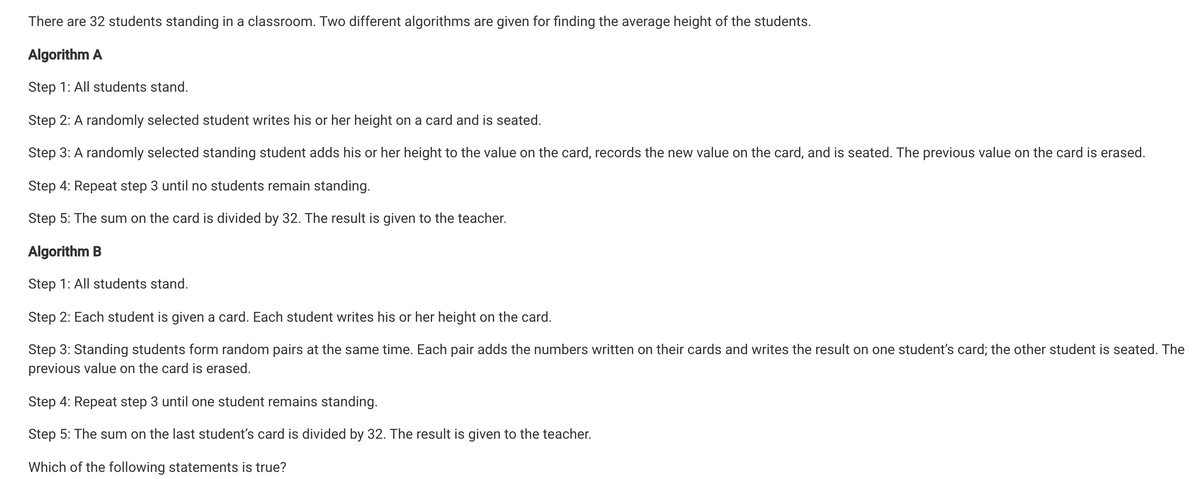Which of the following statements is true? A Algorithm A always calculates the correct average, but Algorithm B does not. B) Algorithm B always calculates the correct average, but Algorithm A does not. c) Both Algorithm A and Algorithm B always calculate the correct average. Neither Algorithm A nor Algorithm B calculates the correct average.
Which of the following statements is true? A Algorithm A always calculates the correct average, but Algorithm B does not. B) Algorithm B always calculates the correct average, but Algorithm A does not. c) Both Algorithm A and Algorithm B always calculate the correct average. Neither Algorithm A nor Algorithm B calculates the correct average.
Database System Concepts
7th Edition
ISBN:9780078022159
Author:Abraham Silberschatz Professor, Henry F. Korth, S. Sudarshan
Publisher:Abraham Silberschatz Professor, Henry F. Korth, S. Sudarshan
Chapter1: Introduction
Section: Chapter Questions
Problem 1PE
Related questions
Question

Transcribed Image Text:There are 32 students standing in a classroom. Two different algorithms are given for finding the average height of the students.
Algorithm A
Step 1: All students stand.
Step 2: A randomly selected student writes his or her height on a card and is seated.
Step 3: A randomly selected standing student adds his or her height to the value on the card, records the new value on the card, and is seated. The previous value on the card is erased.
Step 4: Repeat step 3 until no students remain standing.
Step 5: The sum on the card is divided by 32. The result is given to the teacher.
Algorithm B
Step 1: All students stand.
Step 2: Each student is given a card. Each student writes his or her height on the card.
Step 3: Standing students form random pairs at the same time. Each pair adds the numbers written on their cards and writes the result on one student's card; the other student is seated. The
previous value on the card is erased.
Step 4: Repeat step 3 until one student remains standing.
Step 5: The sum on the last student's card is divided by 32. The result is given to the teacher.
Which of the following statements is true?

Transcribed Image Text:Which of the following statements is true?
A
Algorithm A always calculates the correct average, but Algorithm B does not.
В
Algorithm B always calculates the correct average, but Algorithm A does not.
C
Both Algorithm A and Algorithm B always calculate the correct average.
D
Neither Algorithm A nor Algorithm B calculates the correct average.
Expert Solution
This question has been solved!
Explore an expertly crafted, step-by-step solution for a thorough understanding of key concepts.
This is a popular solution!
Trending now
This is a popular solution!
Step by step
Solved in 2 steps

Knowledge Booster
Learn more about
Need a deep-dive on the concept behind this application? Look no further. Learn more about this topic, computer-science and related others by exploring similar questions and additional content below.Recommended textbooks for you

Database System Concepts
Computer Science
ISBN:
9780078022159
Author:
Abraham Silberschatz Professor, Henry F. Korth, S. Sudarshan
Publisher:
McGraw-Hill Education

Starting Out with Python (4th Edition)
Computer Science
ISBN:
9780134444321
Author:
Tony Gaddis
Publisher:
PEARSON

Digital Fundamentals (11th Edition)
Computer Science
ISBN:
9780132737968
Author:
Thomas L. Floyd
Publisher:
PEARSON

Database System Concepts
Computer Science
ISBN:
9780078022159
Author:
Abraham Silberschatz Professor, Henry F. Korth, S. Sudarshan
Publisher:
McGraw-Hill Education

Starting Out with Python (4th Edition)
Computer Science
ISBN:
9780134444321
Author:
Tony Gaddis
Publisher:
PEARSON

Digital Fundamentals (11th Edition)
Computer Science
ISBN:
9780132737968
Author:
Thomas L. Floyd
Publisher:
PEARSON

C How to Program (8th Edition)
Computer Science
ISBN:
9780133976892
Author:
Paul J. Deitel, Harvey Deitel
Publisher:
PEARSON

Database Systems: Design, Implementation, & Manag…
Computer Science
ISBN:
9781337627900
Author:
Carlos Coronel, Steven Morris
Publisher:
Cengage Learning

Programmable Logic Controllers
Computer Science
ISBN:
9780073373843
Author:
Frank D. Petruzella
Publisher:
McGraw-Hill Education